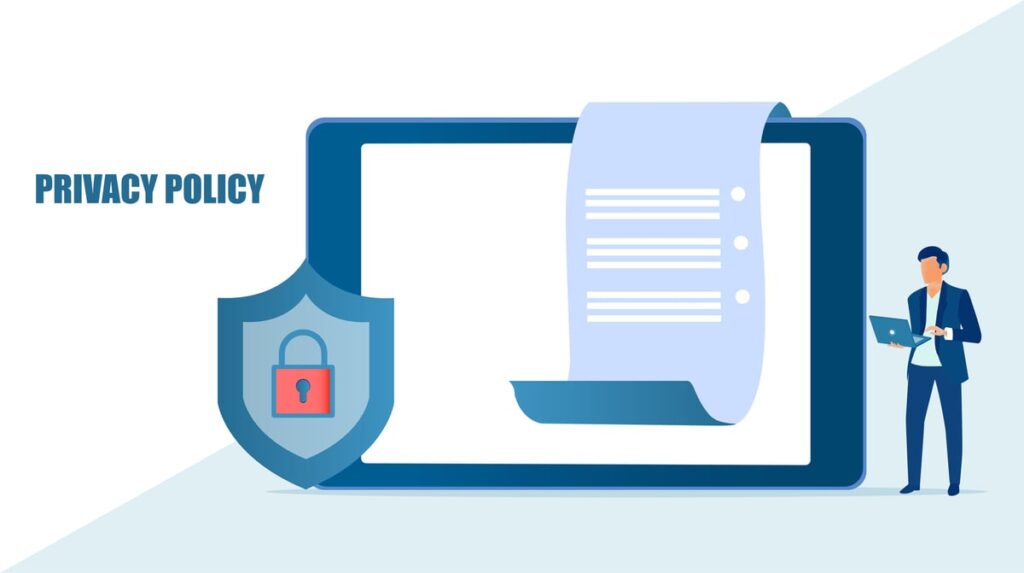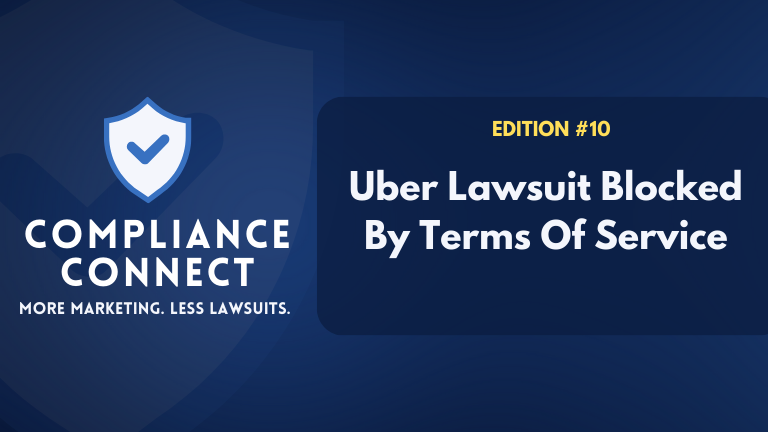Good morning! This is the tenth edition of the Compliant Connect newsletter.
The goal is simple: to keep you in the loop on what the FTC and other regulatory agencies are up to so that you can protect yourself.
These newsletters will land in your inbox twice a week – Mondays and Thursdays.
Remember: this is NOT legal advice, only information!
Here’s the rundown today…
- 🚕 Uber Potentially Saved By Legal Pages Few People Read
- 🦞 FTC Sends A Warning Shot At Seafood Restaurants
- 📄 Breakdown Of ESSENTIAL Legal Pages
- 🌉 How A California Regulation Might Impact You (Even If You Don’t Live There)
- 👴🏽 3 Vulnerable Groups That Could Increase Your Exposure
Compliance Digest: What You Should Read Today
Uber Eats Order Prevents Couple From Suing Uber After A Car Crash
A New Jersey couple was seriously injured in a 2022 Uber car accident and later sued the company.
A New Jersey court ruled that their lawsuit needs to go through arbitration. The couple unknowingly consented to this when their 12-year-old daughter used Uber Eats and checked the box consenting to the terms-of-service agreement.
Uber claims that the couple agreed to these terms of use multiple times.
By going through arbitration instead of court, Uber will save an enormous amount of money.
This case reveals why it’s important to make sure your “boring” legal pages that few people read are written correctly.
Greg and Anik talked about a similar case involving Disney last month.
US Seafood Restaurants Warned Over False Claims
The FTC is warning major seafood restaurant chains about false advertising regarding locally caught seafood.
Many restaurants market their seafood as locally sourced even though the U.S. imports about 80% of its seafood.
An FTC commissioner sent letters to top seafood chains like Red Lobster and Long John Silver’s, reminding them that misleading claims could lead to investigations.
This follows new FTC guidance stating that menu descriptions, decor, and social media posts suggesting local seafood must be truthful.
This story is a good reminder that businesses in EVERY niche need to pay attention to compliance.

What Legal Pages Do You Need?
Do you know how many times we’ve searched on Google and saw people who have copied and pasted our terms and privacy policies?
If you’re one of them, congratulations—you picked up some solid terms. But, here’s a heads-up…
Those terms might not work for your business. You’re in strict violation. You’re risking a lawsuit.
Now, I get it—these legal pages are confusing, and sometimes, it feels easier to just copy and paste.
However, these pages aren’t just filler on your website; they’re crucial to your protection. As you saw in the Compliance Digest section, companies like Uber and before that Disney have attempted to use these pages to avoid paying massive legal fees.
When these pages aren’t done correctly, they can lead to multi-million dollar lawsuits.
The stakes are high.
So, what pages do you need to implement? Let’s go over some of the most important…
Terms and Conditions
These establish the rules of engagement between you and your users.
This isn’t JUST about class action waivers or liability limits. Imagine someone attending your event, slips, and falls. Without solid terms, you could be exposed to a major lawsuit.
If big players like Uber and Disney are relying on their terms to dismiss cases, you should too.
Privacy Policy
This one’s non-negotiable. It’s where you disclose how you handle consumer data. And trust me, people care.
Ever heard of the California Consumer Privacy Act (CCPA) or GDPR? These are laws that require you to be clear on how you collect, store, and share user data.
Don’t have this in place? You’re practically inviting a lawsuit. Meta settled a $725 million lawsuit just last year for not getting the proper consent on how they collected user data.
If they’re vulnerable despite their massive legal teams, think about how exposed your business could be.
Contact Page
Real contact information signals that you’re not hiding from your customers. The easier you make it for someone to reach you, the more trustworthy you appear.
This could be critical in avoiding other legal issues, like copyright infringement notices. Your website needs a mechanism for people to contact you about any potential misuse of their intellectual property, or you risk lawsuits.
Get these pages done by a professional.
It’s not expensive, and absolutely worth it.
There are many templates floating around, and some are a good starting point. However, it’s best to get them customized to your specific business needs. This can save you thousands, if not more, in legal fees down the line.
You can even take it one step further by including additional layers of protection.
For example, a full disclosure page is often a smart move, especially if you offer educational content or real estate advice. You need to be clear about what you’re responsible for—and what you’re not.
Don’t forget to also include Digital Millennium Copyright Act (DMCA) policies. This can shield you from predatory lawsuits if someone accuses you of using their intellectual property.
Just having a DMCA notice on your site can be the difference between receiving a demand letter asking for thousands of dollars or simply being given the opportunity to take down the offending content.
Bottom line: Don’t leave yourself vulnerable. Protect yourself and your business with properly drafted legal pages.
It’s not a nice-to-have; it’s ESSENTIAL.
Did You Know…
California’s strong privacy law (the CCPA) applies to any business that meets ANY of these criteria…
- Have a gross annual revenue of over $25 million.
- Buy, sell, or share the personal information of 100,000 or more California residents or households.
- Derive 50% or more of their annual revenue from selling California residents’ personal information.

Quick Compliance Tip: Groups To Refund Even Faster
Too often marketers are cute with their refund policies. We see marketers doing things like…
● Asking for signed waivers of no refunds
● Creating a barrage of conditions to “qualify” for a refund
The goal of these techniques is to make it HARD to get a refund.
This is a problem because customers who want refunds but can’t get them are a common source of complaints to the FTC.
In many cases, it’s also ILLEGAL. Most products you sell require at minimum a 3 day cooling off period where you must give a refund for any reason. If you don’t disclose this, then the refund period could be unlimited.
It’s best to just give unhappy customers a refund.
Your refund policy should be liberal with all customers, but there are some groups you need to be extra sensitive to.
This is because regulators protect them even more aggressively. Many have their own organizations that protect them over and above the protection offered by the State Attorney General or FTC.
These groups include…
● Seniors
● Disabled people
● Veterans
These are people that are more vulnerable to being tricked or manipulated. They also often have loved ones who will get very upset if they found out that someone was taking advantage of them.
You can’t refuse these customers (that’s illegal). But you can, and SHOULD, be aware and vigilant and make sure you are ready to refund them in case of any issues.
Ignoring this will dramatically increase your exposure to a lawsuit.
